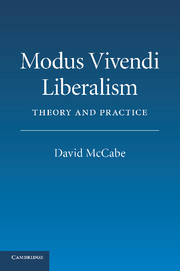Book contents
- Frontmatter
- Contents
- Acknowledgments
- PART I STARTING ASSUMPTIONS
- PART II THE FAILURE OF THE MAIN ARGUMENTS
- PART III MODUS VIVENDI LIBERALISM
- 7 The case for modus vivendi liberalism
- 8 The challenge of gender equality
- 9 Compulsory education in the MVL state
- 10 The limits of modus vivendi liberalism
- Bibliography
- Index
7 - The case for modus vivendi liberalism
Published online by Cambridge University Press: 06 July 2010
- Frontmatter
- Contents
- Acknowledgments
- PART I STARTING ASSUMPTIONS
- PART II THE FAILURE OF THE MAIN ARGUMENTS
- PART III MODUS VIVENDI LIBERALISM
- 7 The case for modus vivendi liberalism
- 8 The challenge of gender equality
- 9 Compulsory education in the MVL state
- 10 The limits of modus vivendi liberalism
- Bibliography
- Index
Summary
THE LIBERALISM OF FEAR
The argument to this point has been chiefly critical. I have tried to show that value pluralism corroborates the critic's objections to the liberal state but also that liberals cannot turn pluralism to their advantage, since that idea is both controversial and rejected by many of the citizens they need to persuade. Some may object that my argument employs a bait and switch – Chapters 3 through 5 invoking pluralism to defeat liberalism, Chapter 6 invoking monism to the same end. But that objection ignores the fact that the liberal project aims for an argument that is both rationally compelling and compatible with the justificatory requirement (JR). The earlier chapters showed how value pluralism undermines the persuasiveness of liberal arguments. Chapter 6 argued that pluralist liberalism cannot meet JR. Since liberals are committed to success on both axes, failure in either respect defeats their project as traditionally conceived.
At this point liberals might make various moves to defend their position. One approach is to insist that only those who recognize value pluralism qualify as reasonable citizens, to whom justification is owed. As I argued in the previous chapter, that move sets the epistemic threshold too high. Alternatively, liberals could deny value pluralism any role in assessing political arrangements. Though this move might weaken the critic's objections, it deprives political philosophy of an important truth in value theory and so calls into question the soundness of any conclusions so reached.
- Type
- Chapter
- Information
- Modus Vivendi LiberalismTheory and Practice, pp. 125 - 165Publisher: Cambridge University PressPrint publication year: 2010

